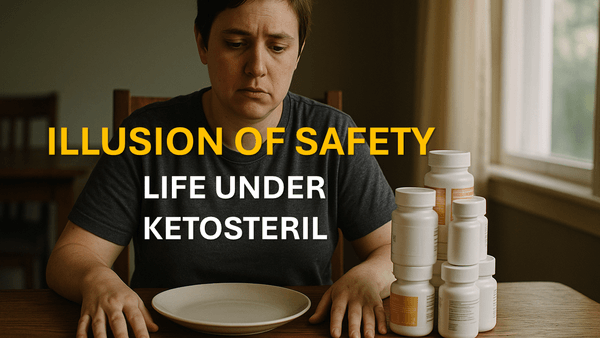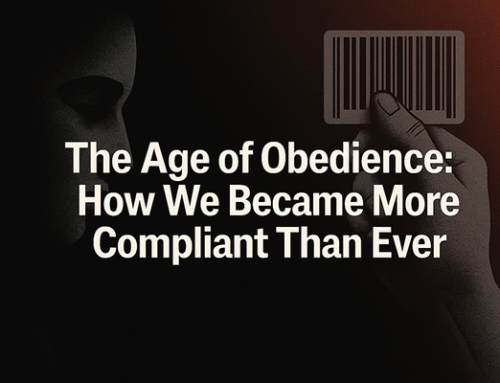In chronic kidney disease (CKD), patients are often told their survival depends on swallowing handfuls of Alpha-Ketoanalogue & Essential Amino Acid tablets — most commonly sold under the brand Ketosteril. Doctors present these pills as ingenious: nitrogen-free “building blocks” that help the liver recycle waste into fresh amino acids. Combined with a very-low protein diet (VLPD), the pitch is simple: take these tablets, eat less protein, and you can delay dialysis.
On paper, the biochemistry is elegant. In lived reality, it is a prison of borrowed time.
The Kitchen and the Plumbing
Imagine your body as a kitchen — pots simmering, chefs working, spices filling the air. Proteins from food are not garbage; they are the ingredients of life.
Now picture the plumbing beneath the floor clogging. The pipes can no longer carry waste away. Instead of repairing the pipes, the doctor comes in and says:
“Turn off the tap. Eat less. Swallow these pills. Forget the feast. Survive on scraps.”
These pills — Alpha-Ketoanalogues — are sold as recipes that help your chefs recycle leftovers into meals. On paper, it sounds ingenious. In truth, it’s a cage.
The Biochemical Trick
Ketoanalogues are amino acid “skeletons” without nitrogen. The liver can graft nitrogen from waste molecules onto them, creating new essential amino acids without adding to the body’s nitrogen load. Paired with a VLPD, this trick lowers urea and phosphate levels and can sometimes slow the decline of kidney function.
But elegance in theory does not mean liberation in practice. The kidneys still fail. The body is not cured. The treatment merely stretches the road to dialysis; it does not change the destination.
The Promise of Time
Doctors whisper: “This will buy you years.”
But whose years are they?
- You choke down 20 tablets a day.
- You push away the meat, the milk, the lentils, the bread you once shared at festivals.
- You sit at the family table but eat differently, always differently.
- Every bite tastes like fear — is this too much protein? Will this kill my kidneys faster?
Yes, dialysis may be delayed. But the price is not simply time. The price is life while waiting for the machine.
The Great Reversal
And then, when the machine finally arrives — the dialysis pump with its humming tubes and artificial filters — the decree reverses overnight.
“Eat more protein now. You need strength for the machine.”
So after years of starvation, after years of pill-popping and joyless eating, you are suddenly told to feast again. Only now your body is weaker, your muscles thinner, your spirit bruised.
This is not medicine. This is mockery.
Who Really Wins
- Pharmaceutical companies win — selling expensive tablets not found in nature.
- The system wins — delaying dialysis saves money and improves statistics.
- Doctors win — they can claim, “See, we slowed the decline.”
But the patient loses.
They lose the festivals, the meals, the dignity of choosing what nourishes them. They lose years of freedom, traded for the illusion of borrowed time.
Food Is Not Garbage
Protein is not poison. Food is not the enemy.
The enemy is failed plumbing, not the water of life.
By reducing food to “nitrogen load,” medicine declares war on what is sacred: the shared meal, the body’s joy, the soul’s nourishment. And in its place, it offers a handful of tablets — a bargain of survival without living.
The Honest Choice
If patients were told the truth, the choice would be clear:
- Take the tablets if buying 1–2 years matters — for example, to reach a transplant window or push dialysis away for a season.
- Refuse the tablets if what matters is quality, not length — the freedom to eat, to share meals, to live without pill slavery.
Neither answer is wrong.
What is wrong is pretending the pills are salvation, forcing them as mandatory, and hiding the cost in joy, dignity, and freedom.
Final Word: Time or Life?
These pills do not fix kidneys. They fix nothing.
They only stretch the road to dialysis — a road that ends in tubes and machines.
So the question is not: Do you want more time?
The real question is: Do you want more life in the time you have?
Because Alpha-Ketoanalogues may give you years,
but they will take your feasts, your food, your freedom.
They will make you live like a prisoner,
while the clock still ticks toward the same end.
This is not healing.
This is a prison of borrowed time.








Potential Risks and Considerations of Life under Ketosteril:
General Risks of Amino Acid Supplementation:
While the focus of the provided studies is on ketoanalogues, one review comprehensively examines the potential side effects of increased intake of various amino acid supplements in general 4. It is crucial to distinguish between general amino acid supplements and specifically formulated ketoanalogue supplements, which are designed to be nitrogen-free. The potential risks outlined for individual amino acids (like arginine, branched-chain amino acids, etc.) often involve doses and contexts different from those used in ketoanalogue therapy for CKD. Nevertheless, the theoretical risks highlighted include:
Gastrointestinal distress: Nausea, abdominal pain, vomiting, and diarrhea have been reported with high doses of certain amino acids like arginine 4.
Ammonia production: In individuals with impaired hepatic or renal function, high intake of certain amino acids (e.g., glutamine, histidine, arginine) could potentially increase ammonia production, posing a theoretical risk 4.
Amino acid imbalances: High doses of one amino acid can compete for transporters at cell membranes, potentially leading to imbalances in the absorption and blood levels of other amino acids 4.
Effects on tumor growth: Some experimental data suggest that certain amino acids (e.g., glutamine, arginine) might be essential for tumor cell growth. However, the clinical relevance of this for ketoanalogue supplementation in CKD patients is not established 4.
Oxidative stress: Long-term, high-dose arginine supplementation has been linked to increased oxidative stress and a loss of therapeutic effect (“L-arginine tolerance”) in some cardiovascular studies, and it has been suggested it should be avoided in the elderly population 4. It is important to note that typical ketoanalogue formulations are designed to mitigate nitrogen load and may not share these risks in the same way.
Lack of Harm in CKD-Specific Studies:
The systematic reviews and meta-analyses focusing specifically on ketoanalogue use in diabetic kidney disease (DKD) and non-dialysis CKD patients found the regimens to be “safe and well tolerated, with no evidence of adverse effects on nutritional status” 610. These analyses specifically looked for harms and did not find significant evidence of them in the context of properly managed care.
Context of Use is Critical:
The potential benefits of ketoanalogues are consistently reported in the context of a strictly controlled low-protein or very-low-protein diet 61012. Using these supplements without appropriate dietary protein restriction or medical supervision could theoretically negate their benefits and potentially contribute to nitrogen waste accumulation, but this is not directly reported as “harm” from the supplement itself in the provided studies.